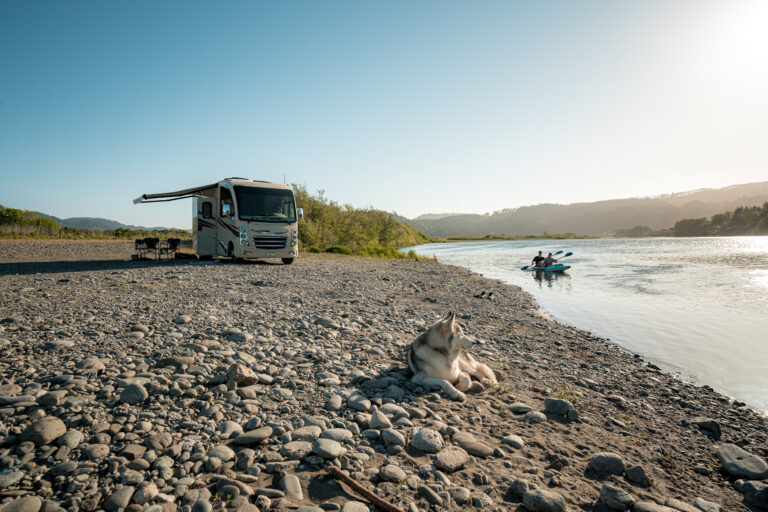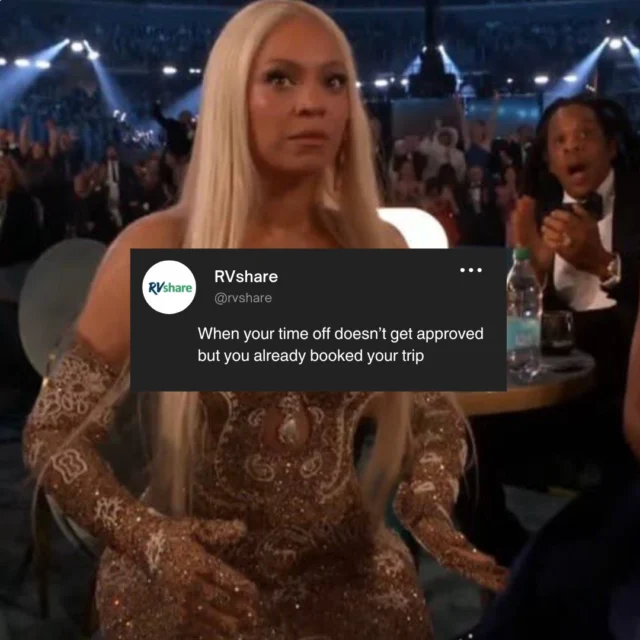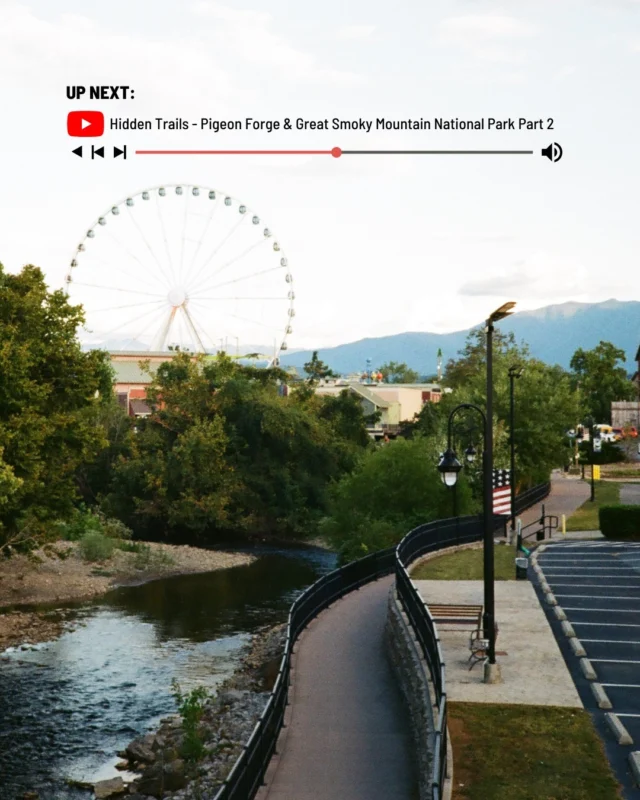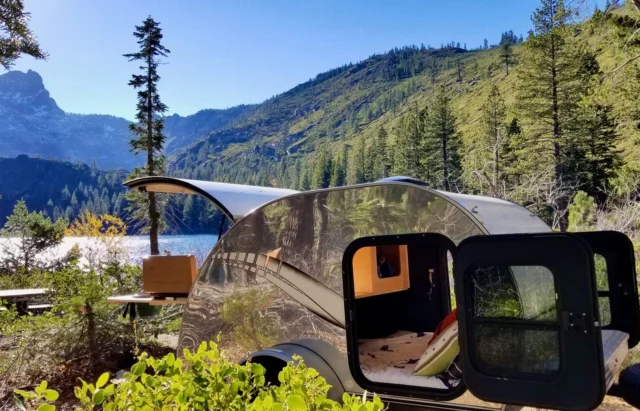
Spring is here, and that means it’s time to jump into spring RV maintenance. From checking out all your mechanical systems to giving the interior of your coach a thorough once-over, there’s quite a bit to do on your spring RV maintenance checklist.
Lucky for you, we’re here to help you get down to business and make sure your rig is in ship-shape and ready to go for your upcoming summer travels!
This post contains affiliate links. RVshare may receive compensation if you make a purchase after clicking on a product link.
RV Engine Maintenance
Just as you would for your regular around-town vehicle, you need to make sure you keep up with your RV’s basic engine and mechanical systems. This will help ensure your trip is not interrupted by an unfortunate breakdown.
Spring RV maintenance tasks to keep up with and things to check under the hood include:
- Engine oil changes every 3,000 miles
- Check all fluids every 3,000 miles
- Replace the air filter as needed
- Look for leaks
- Follow the manufacturer’s recommended maintenance schedule
- Watch out for odd sounds, smells, etc and get anything out of the ordinary checked out immediately.
RV Generator Maintenance
Your RV generator requires maintenance that is similar to the maintenance you’ll do on your RV engine. Every 100 hours or so of use-time, make sure to change the oil. You’ll also need to change the air filter as needed, as well as the spark plug and fuel filter.
In addition to all of these things, make sure you are running your generator under load for at least an hour a month. This applies even during the winter months, and failing to do so can cause problems with the generator.
Testing RV Lights
You’ll also want to test all of the lights on the outside of your RV.
Check all of the following:
- Headlights
- Taillights
- Brake lights
- Running lights
In the case of a trailer, you may have to plug into your town vehicle to do this test, but it is worth the extra effort.
If you find that a light isn’t working, replacing the bulb is likely to fix the issue. If that doesn’t do it, look for a blown fuse or bad wiring behind the light.
RV Tire Maintenance
Be sure to check out your RV’s tires 1) in the spring before camping season begins, 2) before and after every trip you take, as well as 3) periodically during times when your rig isn’t in use. If the tires show signs of uneven or excessive wear (or even rot), replace them right away. A tire blowout can put you in an unsafe situation and cause extreme damage to your RV.
Some RV owners choose to install a TPMS on their RV tires in order to carefully monitor them while driving.
Preventing Water Damage
Thoroughly checking for water leaks is one of the most important spring RV maintenance tasks. These leaks can lead to water damage and other problems that could cause a large repair bill if left alone to get worse.
Look around for signs of water intrusion. These might include:
- Wet spots
- Soft spots on the floor or walls
- Discolored walls or ceiling
- Wrinkled wallpaper
- Mildew or mold spots inside the RV
- Delamination on the outside of the RV
If you find a leak, use RV sealant to seal it up right away and then do your best to dry the area well to prevent further damage.
You should also take the time to head outside and make sure your RV’s roof and roof seals—as well as the seams on the sides of your RV—are in good repair. Do this at least once a quarter, including during springtime.
Be especially vigilant around any roof openings, such as fans, A/C units, and sewer vents, looking for spots where water might sneak in. Leaks can occur at the seals in those places, necessitating RV roof repair if you don’t catch them in time.
Caring for Your RV Water System
Spring is also a great time to give your RV’s holding tanks and holding tank sensors a complete cleansing. Doing this spring RV maintenance job also dewinterizes the water system, allowing you to kill two birds with one stone.
- To clean your freshwater tank, you will fill it with a diluted bleach mixture (about ¼ cup of bleach for every 15 gallons of water).
- Let the mixture sit in the tank for a day or so, then run it through the water lines and faucets using the water pump.
- You can then let the bleach mixture sit in the water lines and wastewater tanks for another 24 hours.
- Open low-point drains and dump the waste tanks to drain the bleach water.
- Refill the fresh tanks with plain potable water.
- Run the clean water through the lines and faucets to clear any remaining bleach.
- Dump the tanks and open the low-point drains to drain the rinse water before using the system again.
If your wastewater tanks are still dirty after doing this, we recommend using a backflush tool to flush the tanks out with water. This might take some time, but you will be able to totally clean your tanks of debris, get rid of smells, and get your sensors working once again with nothing more than a strong jet of water.
Don’t forget to use approved RV toilet chemicals to promote waste breakdown and reduce odors after you’ve cleaned the tanks!
RV Air Conditioner Maintenance
Air conditioner maintenance is also an important spring RV maintenance task. This is especially true if you’re planning to travel in your rig in the upcoming hot summer months.
Every RV air conditioning unit is different and you’ll want to consult your manufacturer’s literature for exact instructions. However, there are simple maintenance steps that every RV owner should be aware of and perform:
- Visually inspect the A/C shroud for damage and replace if necessary.
- Change or clean the inside air filter.
- Carefully use a vacuum cleaner to clean the A/C fins under the shroud.
- Carefully straighten any bent fins using a special comb.
Caring for RV Batteries
Hopefully you’ve put your RV batteries on a trickle charger in a warm place during the winter months. If not, you might find yourself in need of new RV batteries before you head out on your first spring trip.
To get your RV batteries ready for the camping season, take them to an auto parts store and have them tested. If they are still good to go, charge them up. Make sure to clean the contact points well, and in the case of flooded batteries, check the fluid level and top each cell off with distilled water if necessary.
Testing the LP Gas System
Another necessary piece of spring RV maintenance? Testing the LP gas system. Fortunately, this is pretty easy to do:
- Start by filling your RV’s propane tank(s).
- Open the tank to ensure fuel is flowing into the lines.
- Allow propane to bleed through the lines for a few seconds by holding a stove knob in the ‘light’ position.
- Light all burners.
- Light the oven.
- Turn the fridge on in gas mode.
- Fill the water heater tank and turn the water heater on in gas mode.
- Turn on the propane furnace.
- If everything lights up correctly, you’re good to go.
- If an appliance does not work correctly, check the burner tubes and surrounding areas for bug nests and clean everything with compressed air.
If you smell propane while testing the system, turn the flow of fuel off immediately and spray soapy water in the area of the leak to find exactly where it’s coming from. Replace the leaking piece before using propane again.
Testing Alarms
As a safety precaution, it’s a good idea to add testing alarms to your spring RV maintenance to-do list. Every RV should have a smoke alarm, a carbon monoxide detector, and an LP gas detector. Test each of these and replace batteries as necessary. This is also a good time to inspect fire extinguishers and replace them if needed.
Clean Up
Finally, you will want to get your RV all cleaned up and looking spiffy:
- Use warm water and a mild soap to clean any debris off the roof, as sap and bird droppings can actually damage the coating on the roof.
- Wash the awning using the same soap and water solution, along with a soft-bristled, long-handled brush.
- Clean the outside of the RV with an auto cleaning product and a soft brush with a long handle, and then finish it off with wax.
- Head inside and clean the floors, walls, and furniture.
- Wipe out all cabinets and stock as needed for the upcoming camping season.
Spring RV maintenance is important, and it’s definitely a good idea to take advantage of the warm weather to get your RV ready for the upcoming camping season. That said, you will need to continue to take care of your RV all year long. This is why we recommend setting up a regular preventative maintenance schedule to keep you on track.
Finished with your spring RV maintenance? Why not share your work with the world by renting your RV out right here on RVshare?






